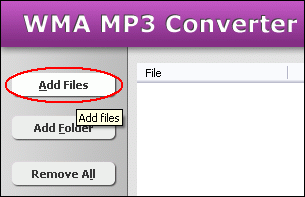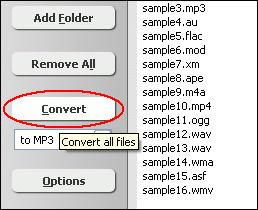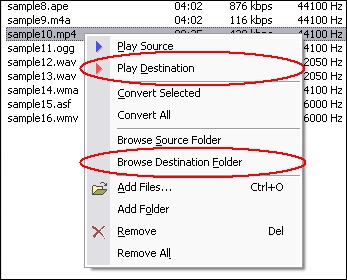M4A to WMVConvert M4A to WMV, M4A to WMV Converter |
 |
| Home | Getting Started | Download | Buy Now! | Screen Shots | FAQ | Support | Contact |
M4A to WMV Converter converts M4A to WMV. The software is an ALL-IN-ONE audio converter that supports more than 100 audio and video files. M4A to WMV Converter supports batch conversion and, is full compatible with Vista and Windows 7.
What is M4A? Because of its exceptional performance and quality, Advanced Audio Coding (AAC) is at the core of the MPEG-4, 3GPP and 3GPP2 specifications and is the audio codec of choice for Internet, wireless and digital broadcast arenas. AAC provides audio encoding that compresses much more efficiently than older formats, such as MP3, yet delivers quality rivaling that of uncompressed CD audio. What is WMV? A WMV file is in most circumstances encapsulated in the Advanced Systems Format (ASF) container format. The file extension .WMV typically describes ASF files that use Windows Media Video codecs. The audio codec used in conjunction with Windows Media Video is typically some version of Windows Media Audio, or in rarer cases, the deprecated Sipro ACELP.net audio codec. Microsoft recommends that ASF files containing non-Windows Media codecs use the generic .ASF file extension. The ASF container can optionally support digital rights management using a combination of elliptic curve cryptography key exchange, DES block cipher, a custom block cipher, RC4 stream cipher and the SHA-1 hashing function. Although WMV is generally packed into the ASF container format, it can also be put into the AVI or Matroska container format. The resulting files have the .AVI and .MKV file extensions, respectively. WMV can be stored in an AVI file when using the WMV 9 Video Compression Manager (VCM) codec implementation. Another common way to store WMV in an AVI file is to use the VirtualDub encoder. Windows Media Video (WMV) is the most recognized video format within the WMV family. Usage of the term WMV often refers to the Microsoft Windows Media Video codec only. Its main competitors are MPEG-4 AVC, AVS, RealVideo, DivX, and Xvid. The first version of the codec, WMV 7, was introduced in 1999, and was built upon Microsoft's implementation of MPEG-4 Part 2. Continued proprietary development led to newer versions of the codec, but the bit stream syntax was not frozen until WMV 9. While all versions of WMV support variable bit rate, average bit rate, and constant bit rate, WMV 9 introduced several important features including native support for interlaced video, non-square pixels, and frame interpolation. WMV 9 also introduced a new profile titled Windows Media Video 9 Professional, which is activated automatically whenever the video resolution exceeds 300,000 pixels (e.g., 528x576, 640x480 or 768x432 and beyond) and the bitrate 1000 kbit/s. It is targeted towards high-definition video content, at resolutions such as 720p and 1080p. Convert M4A to WMV Related Topics: M4A to WMV, CDA to WMV, FLAC to WMV, MXF to WMV, W64 to WMV, ADX to WMV, XM to WMV, ADTS to WMV, ALAC to WMV, AAC to WMV, CD to WMV, MKA to WMV, M1A to WMV, MP3 to WMV, ULAW to WMV, WAVE64 to WMV, MOD to WMV, APE to WMV, MPA to WMV, AWB to WMV, MPC to WMV, OGG to WMV, DTS to WMV, MPP to WMV, SHN to WMV, MTM to WMV, MO3 to WMV, M4B to WMV, RA to WMV
|
| Home | Getting Started | Download | Buy Now! | Screen Shots | FAQ | Support | Contact | Links |
| Copyright © 2007-2014 Hoo Technologies All rights reserved. Privacy Policy |





